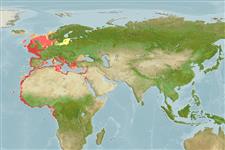>
Eupercaria/misc (Various families in series Eupercaria) >
Sciaenidae (Drums or croakers)
Etymology: Argyrosomus: Greek, argyros = silvered, silver + Greek, soma = body (Ref. 45335); regius: A. hololepidotus in Ref. 57396 refers to A. regius and A. coronus based distribution and Ref. 11025..
Environment: milieu / climate zone / depth range / distribution range
Sinh thái học
Biển; Thuộc về nước lợ Sống nổi và đáy; Ở đại duơng, biển (Ref. 51243); Mức độ sâu 15 - 300 m (Ref. 2683). Subtropical; 65°N - 6°S, 23°W - 36°E
Eastern Atlantic: Norway to Gibraltar and Congo, including the Mediterranean and the Black Sea. Migrated to the Red Sea via the Suez Canal.
Length at first maturity / Bộ gần gũi / Khối lượng (Trọng lượng) / Age
Maturity: Lm ?, range 80 - ? cm
Max length : 230 cm TL con đực/không giới tính; (Ref. 5377); common length : 150 cm TL con đực/không giới tính; (Ref. 3593); Khối lượng cực đại được công bố: 103.0 kg (Ref. 11036)
Các tia vây lưng cứng (tổng cộng) : 10 - 11; Các vây lưng mềm (tổng cộng) : 27 - 29. Rough scales, Second dorsal fin (soft ray) twice as long as first, spiny rayed dorsal fin (Ref. 35388).
Adults are found inshore and shelf waters, close to bottom as well as in surface and mid-waters, pursuing shoals of clupeids and mugilids. They congregate inshore to spawn during spring and summer. Juveniles and sub-adults enter estuaries and coastal lagoons (Ref. 3593). Both adults and juveniles are migratory moving along shore or offshore-onshore in response to temperature change (Ref. 11025). Feed on fishes and swimming crustaceans.
Life cycle and mating behavior
Maturities | Sự tái sinh sản | Spawnings | Egg(s) | Fecundities | Ấu trùng
Chao, L.N. and E. Trewavas, 1990. Sciaenidae. p. 813-826. In J.C. Quero, J.C. Hureau, C. Karrer, A. Post and L. Saldanha (eds.) Check-list of the fishes the eastern tropical Atlantic (CLOFETA). JNICT, Lisbon; SEI, Paris; and UNESCO, Paris. Vol. 2. (Ref. 3593)
IUCN Red List Status (Ref. 130435)
Threat to humans
Harmless
Human uses
Các nghề cá: Tính thương mại; cá để chơi: đúng
Các công cụ
Special reports
Download XML
Các nguồn internet
Estimates based on models
Preferred temperature (Ref.
123201): 13.3 - 19.4, mean 15.3 °C (based on 169 cells).
Phylogenetic diversity index (Ref.
82804): PD
50 = 0.5020 [Uniqueness, from 0.5 = low to 2.0 = high].
Bayesian length-weight: a=0.00832 (0.00756 - 0.00915), b=3.07 (3.04 - 3.10), in cm total length, based on LWR estimates for this species (Ref.
93245).
Mức dinh dưỡng (Ref.
69278): 4.3 ±0.75 se; based on food items.
Thích nghi nhanh (Ref.
120179): thấp, thời gian nhân đôi của chủng quần tối thiểu là 4.5 - 14 năm (K=0.09).
Prior r = 0.28, 95% CL = 0.19 - 0.42, Based on 3 data-limited stock assessments.
Fishing Vulnerability (Ref.
59153): Very high vulnerability (79 of 100).
Climate Vulnerability (Ref.
125649): Moderate to high vulnerability (48 of 100).
Nutrients (Ref.
124155): Calcium = 18.3 [6.5, 50.3] mg/100g; Iron = 0.438 [0.149, 1.307] mg/100g; Protein = 19.4 [17.5, 21.4] %; Omega3 = 0.322 [0.172, 0.553] g/100g; Selenium = 34.1 [11.0, 127.8] μg/100g; VitaminA = 11.8 [3.7, 39.9] μg/100g; Zinc = 0.471 [0.336, 0.696] mg/100g (wet weight); based on
nutrient studies.
